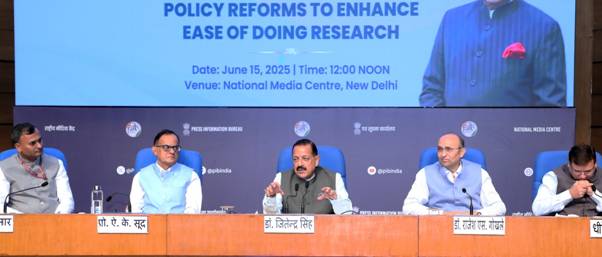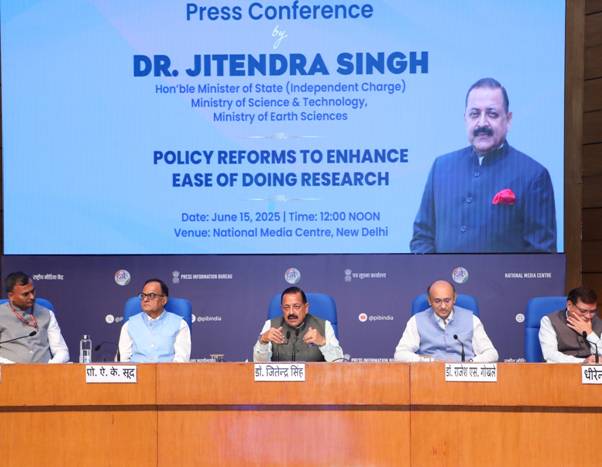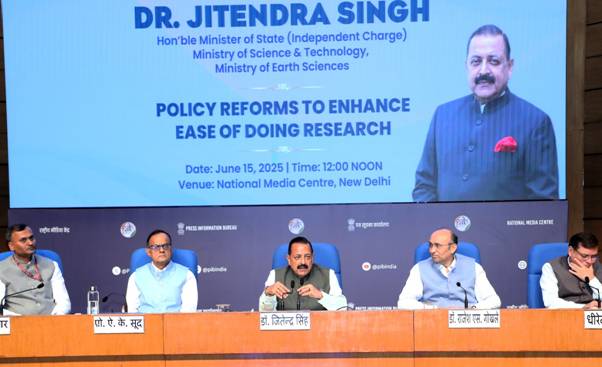Minister Dr. Jitendra Singh announces policy reforms to enhance the ‘Ease of Innovation’, ‘Ease of Research’ and ‘Ease of Science’
Minister Dr. Jitendra Singh announces policy reforms to enhance the ‘Ease of Innovation’, ‘Ease of Research’ and ‘Ease of Science’
In a major policy shift aimed at streamlining the research environment in India, Union Minister of State (Independent Charge) for Science and Technology; Earth Sciences and Minister of State for PMO, Department of Atomic Energy, Department of Space, Personnel, Public Grievances and Pensions, Dr. Jitendra Singh on Sunday announced a set of policy reforms to enhance the “Ease of Innovation” and “Ease of Doing Research”, providing long-awaited relief to innovators, researchers scholars, scientists and institutions across the country.
Addressing a press conference at The National Media Centre in the national capital, Dr. Jitendra Singh unveiled decisions that will enable academic and research institutions to bypass some of the most cited hurdles in their day-to-day functioning—particularly around procurement delays and financial ceilings. Such pathbreaking decisions could not have been possible without the personal indulgence and support of Prime Minister Sh Narendra Modi, he added.

The announcement follows extensive consultations led by the Principal Scientific Adviser’s office, drawing insights from 13 IITs and multiple research bodies across India.
One of the most consequential decisions announced is the delegation of procurement powers to institutional heads. Directors of scientific organisations and Vice Chancellors of universities will now be empowered to carry out non-GeM (Government e-Marketplace) purchases for specialized research equipment and materials—a departure from the existing rules which mandated GeM procurement even when suitable items were unavailable.
“We have tried to do away with red tape-ism,” said Dr. Jitendra Singh. “This is a move that places trust in the science leaders of this country. The message from the Modi Government is clear—we trust you, we value you and we are committed to you.”
The government has also revised key financial thresholds under the General Financial Rules (GFR). The ceiling for direct purchases has been doubled from ₹1 lakh to ₹2 lakh, while the range for purchases through departmental committees has been raised from ₹1-10 lakh to ₹2-25 lakh. Similarly, the limits for limited tender enquiries and advertised tenders have been increased from ₹50 lakh to ₹1 crore. Additionally, heads of institutions can now approve Global Tender Enquiries (GTEs) up to ₹200 crore—previously a power reserved for central authorities.

The new policies respond directly to longstanding grievances from research scholars and faculty, who often faced delays due to slow exemption processes and cumbersome procurement rules. A recent report by the Economic Advisory Council to the Prime Minister, along with a presentation by the PSA’s office, highlighted how rules originally intended to ensure transparency were inadvertently hampering scientific progress.
Dr. Jitendra Singh clarified that while these reforms offer greater flexibility, they are built on a foundation of trust and accountability. “There is an enormous responsibility that comes with this autonomy. We are relying on the integrity of the science community to ensure that this flexibility is used judiciously,” he said.
The move is seen as part of the broader national effort to position India as an innovation-driven economy. Dr. Jitendra Singh pointed out that similar liberalisation in the space and nuclear sectors had yielded strong results. “We opened up the space sector, and today we’re looking at an $8 billion economy poised to grow fivefold. These reforms are meant to replicate that success across the R&D ecosystem.”
He also underlined the alignment of these reforms with the National Education Policy 2020, which encourages interdisciplinary flexibility and student-led academic trajectories. “If we are allowing students to choose their learning paths, we must also enable the research ecosystem to support that ambition,” he said.
The policy changes are expected to significantly reduce delays in research projects, improve access to high-end equipment, and motivate young scholars, start-ups, and innovators who had often taken to social media to express their frustration with existing bottlenecks.
With the Modi government completing 11 years in office, the announcement is being seen as a reaffirmation of its focus on science, innovation, and youth-led development—core themes that Dr. Jitendra Singh said are “integral to India’s future global role.”

The press conference was addressed in the presence of Dr. Rajesh S. Gokhale, Secretary, Department of Biotechnology; Prof. A. K. Sood, Principal Scientific Advisor to the Government of India; and Sunil Kumar, Additional Secretary, Department of Science & Technology, with participation from scientists and senior officials of the respective departments.